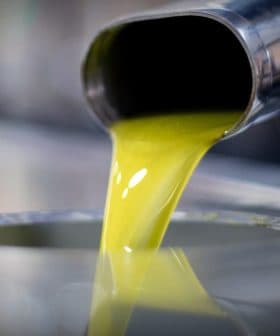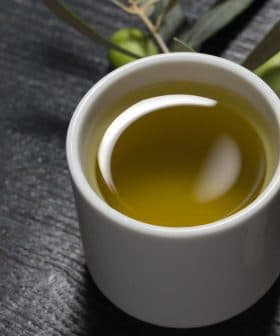U.K. Campaign Against Charred Foods Casts Light on Benefits of the Mediterranean Lifestyle
A U.K. public health campaign aims to increase awareness of the risks of consuming browned food. This latest proclamation and vocal criticism from its opponents have cast renewed focus on the foods and diets known to mitigate cancer risk.
The UK’s Food Standards Agency warns against consuming browned foods due to the presence of acrylamide, a potentially harmful chemical compound, but some experts disagree with the cancer risk associated with it. Cooking in olive oil has been shown to reduce levels of acrylamide, and a Mediterranean-style diet rich in olive oil, lean meat, fish, and fresh produce can help decrease cancer risk.
The United Kingdom’s Food Standard’s Agency (FSA) has spoken out against consuming browned foods, citing that food baked, roasted, grilled or fried at high temperatures possess an overabundance of the chemical compound acrylamide.
Cooking in polyphenol-rich olive oil has been shown to reduce levels of these potentially harmful chemicals.
While no current scientific evidence currently links cancer to the overconsumption of this ‘burnt toast chemical,’ the FSA are advising the public limit to their consumption of foods prepared in this manner. As academics, public educators, and health organizations are voicing disagreement with the study’s assumptions, there remains the consensus that a Mediterranean-style diet rich in lean meat, fish, fresh produce and olive oil (which has actually been proven to inhibit acrylamide formation) decreases cancer risk.
The news that browned and burnt food could pose a potential cancer risk is not a new one. In 2015, the World Health Organisation made an official announcement encouraging the public to limit their consumption of processed meat products such as sausages and bacon, as they could increase the risk of developing cancer. They also stressed that high-temperature cooking of meat (such as at a barbecue) could also increase the carcinogenic properties of foods.
Now the FSA has teamed up with Olympic Gold Medallist Denise Lewis on the Go for Gold campaign after its study of inorganic contaminants, acrylamide, and mycotoxins in the diet of the average UK citizen found that, while it was not possible to avoid consuming acrylamide entirely, the amounts being consumed “are of possible concern for an increased lifetime risk of cancer.”
Meanwhile, renewed attention has fallen on past research into counteracting the formation of acrylamide in foods cooked at high temperatures.
One such study points to using olive oil as a “reliable mitigation strategy” when preparing fried food. The study was conducted almost ten years ago in 2008 by researchers at Italy’s Dipartimento di Scienza degli Alimenti (Department of Food Science) at the University of Napoli Federico II.
Researchers fried slices of potatoes in four different oils at 180 degrees for five, ten, and fifteen minutes testing each one afterward for acrylamide levels. The results revealed that the slices fried in extra virgin olive oil had the lowest concentration of acrylamide, thanks to the ortho-diphenolic compounds present in the oil.
Not everyone is convinced of the danger being presented by acrylamide, however. Sir David Spiegelhalter, Winton Professor of the Public Understanding of Risk at Cambridge University, has spoken out against the study’s conclusions, as has Cancer Research UK and Marji McCullough, Strategic Director of Nutritional Epidemiology at the American Cancer Society.
In fact, many experts are pointing out that limiting one’s consumption of starchy fried foods and fatty, processed meats and increasing one’s intake of fresh fruits and vegetables — something the ‘Go For Gold’ campaign is recommending — is likely to decrease one’s cancer risk anyway, whether you consume acrylamide or not.
It’s an approach echoed by Simon Poole, a UK-based authority on the Mediterranean diet and co-author of the book The Olive Oil Diet: Nutritional Secrets of the Original Superfood. According to Poole, “the advice on the presence of acrylamide in some cooked starchy foods was clearly based on reasonable evidence, however, it is a pity that yet again advice from government food agencies is negative in tone and has been described as disproportionate.”
Interesting report yet we dont join up the dots cooking in #evoo shown to mitigate risk @curtiscord@judyoliveoilhttps://t.co/8R4j3rGH8h
— Dr Simon Poole (@tasteofthemed) January 23, 2017
“The opportunity has been missed to ‘join up the dots’ of dietary advice while citing some robust study data showing that methods of cooking can mitigate the risk of the formation of such compounds,” Poole told Olive Oil Times.
“Cooking in polyphenol-rich olive oil has been shown to reduce levels of these potentially harmful chemicals including related heterocyclic amines in meat as well as the vegetables and bread in this example,” he pointed out.
“While there is no doubt other contributory factors, the lower rates of many types of cancer seen in populations adhering to traditional Mediterranean ways of preparing food may well at least in part relate to the regular use of extra virgin olive oil when cooking vegetables and other foods.”









